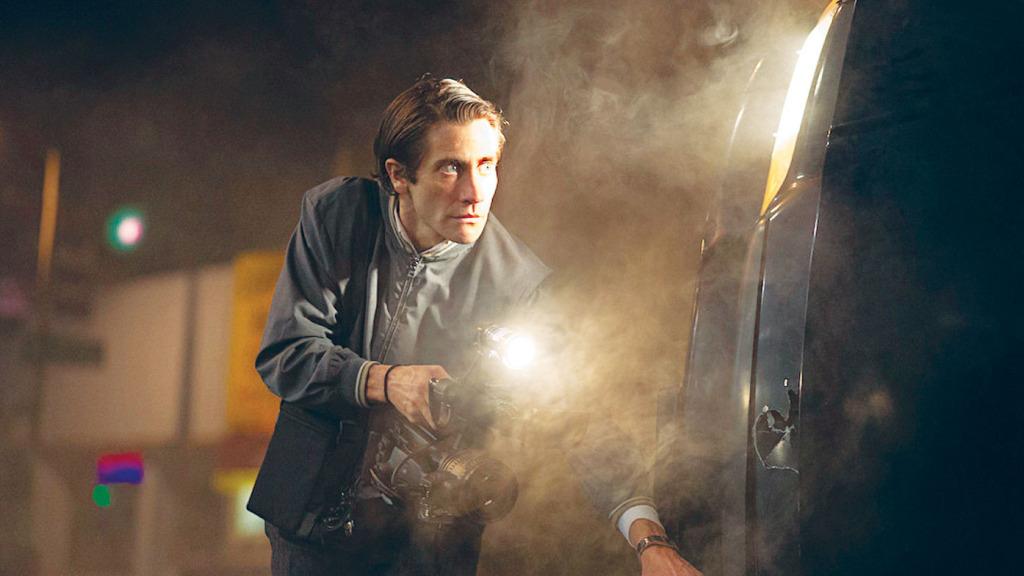As “Nightcrawler” opens, Louis Bloom (Jake Gyllenhaal) can be seen covertly chopping metal fences and stealing from construction sites. Once a security guard’s car lights shine on Bloom, viewers witness his expression change from serious to oddly friendly. He talks innocently to the guard, but after a few kind words, he wrestles the guard to the ground and steals his watch.
This is just one of the many moments that raise questions about Bloom’s personality in the character-driven thriller, “Nightcrawler.” The film follows Bloom, an extremely persistent man looking for a way to make money and, ultimately, a living, as the film implies that he is in need of money. Using some second-hand filming equipment, he falls into the job of videotaping breaking-crime scenes and selling the footage to news agencies for profit. Bloom, however, shows audiences throughout the film that he isn’t afraid to get the footage he needs by any means necessary, as his methods become more and more questionable.
The film does a purposeful job of keeping the audience intrigued, even with its focus mainly being on one character. “Nightcrawler,” while having other cast members, serves as an in-depth analysis about Bloom, the gritty world of freelance videography in Los Angeles and a question of just how far someone would go to have power and success.
These themes are delivered well throughout “Nightcrawler,” thanks to a rousing performance by Gyllenhaal. His dedication and outstanding presence in the film may be what keeps audiences most interested. Bloom is not a simple man, and most of the movie is spent trying to figure out who he really is. Gyllenhaal sells his shadiness to the audience beautifully. Bloom, as a character, has many small mannerisms that make him pop off the screen, all of which are rendered to great success. He holds his shoulders in a certain way, runs awkwardly and, maybe most importantly, boasts an impressive level of expression, ranging from awkwardly happy to rage. It is very possible that director Dan Gilroy could take some credit for this attention to detail, but the role wouldn’t have been anything special without an actor of Gyllenhaal’s caliber.
Aside from Gyllenhaal’s eye-catching performance, “Nightcrawler” spends a long time setting the scene in Los Angeles. With many shots of the empty streets and apartment buildings, the audience certainly gets a sense of where it is. However, this film takes too long setting the scene for Gyllenhaal, with the first two acts of the movie seeming overly detailed and drawn out.
Additionally, the movie is centered around this intriguing person found in Bloom, and yet it avoids testing this character, portraying him as too complacent in the beginning of the film. This movie was vividly advertised as a “pulsating thriller” in all of the trailers, but only the last act really delivers the nail-biting madness promised. If it wasn’t for the brilliance of Gyllenhaal, the film would’ve felt much longer than its almost two-hour run time.
Perhaps most impossible to ignore with “Nightcrawler,” however, is the out-of-place score. In most thriller or action movies, one can expect loud, electronic noises, but “Nightcrawler” took a much more mellow route. Throughout the intense parts of the movie, an odd, high-pitched guitar riff plays. These moments feel dated, as if straight out of a 1980s movie, and betray the film’s tone during some of the more intense moments. A film like “Nightcrawler” benefits most when it focuses on its strengths — a strong lead character and a creepy vibe, and the music opposes this vibe entirely.
Often, it seems “Nightcrawler” doesn’t fully understand what it is as a film. The first two acts are not thrilling at all, but rather an in-depth character analysis of Bloom and how he interacts with the world around him. The film doesn’t really pick up until the last act, but it does a superb job familiarizing the audience with just how Bloom ticks.




















